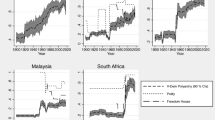Abstract
The paper is focused on regional redistribution of revenue of China and proposes to test two hypotheses. The first one is the positive relationship between inequality in the distribution of local fiscal situation and the central redistribution. The second one is a possible political channel of redistribution: the median voter hypothesis. Both hypotheses are confirmed empirically by the study. Therefore the median voter hypothesis is helpful for analyzing the redistribution to narrow the regional disparities of local expenditure among provinces, although there is no formal voting process on regional redistribution. In the process of decision-making in China, regional preference can be expressed sufficiently without voting actions. Thus Representative Democracy might not be a prerequisite for Median Voter Hypothesis in the case of China.
Similar content being viewed by others
Author information
Authors and Affiliations
Corresponding author
Additional information
The author wishes to thank Professors Emerson Niou and John P. Burn for their help in preparing this article, and the anonymous reviewers for their helpful comments.
Rights and permissions
About this article
Cite this article
Lin, T. The median voter hypothesis: Regional disparities and redistribution in China. J OF CHIN POLIT SCI 11, 21–43 (2006). https://doi.org/10.1007/BF02881526
Issue Date:
DOI: https://doi.org/10.1007/BF02881526




